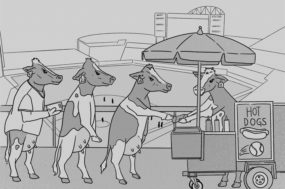Globalization touches virtually every aspect of our business from sales and demand to nutrition and environmental policy, trade, the economy and more.
So whether your milk goes into products destined for the international market or not, every U.S. farmer is affected by the global marketplace.
With increased interest and ability to serve multinational customers, and the growing influence of nutrition thought leaders and nongovernment organizations, the dairy checkoff has expanded its trust and sales-building strategies and partnerships to ensure U.S. dairy is well-positioned to grow global business.
Industry-wide, multifaceted approach
At the core of the checkoff’s global strategy is the U.S. Dairy Export Council’s (USDEC’s) new three-year business plan aimed at a 5 percent increase in U.S. dairy exports.
The plan calls for greater presence and expertise in key regions of the world to ensure we better understand customer and consumer needs, and to demonstrate our commitment to build long-term relationships with foreign governments, standard-setting bodies, universities and other influential organizations.
In addition to USDEC’s market access, trade and marketing efforts, the checkoff is working with sister organizations and supply chain partners to structurally enhance our ability to serve and sustain international growth.
Key areas of focus include:
- The National Dairy Council led thought-leader outreach to ensure U.S. dairy’s story is being told through global-influencer entities like the United Nations, Chicago Council for Global Affairs, World Economic Forum and other nongovernment organizations.
- A pilot program with checkoff partner YUM! Brands to build essential insights into the unique needs of international customers and consumers, and to help enhance U.S. supplier capabilities to demonstrate our commitment to serve global customers.
- A U.S. Dairy Stewardship commitment that aligns farmers, processors and manufacturers, and other value-chain players on a voluntary basis to a common set of practice standards and social responsibility commitments. Internationally based dairy companies are vying for the same customers we are. They sometimes bring a mindset on sustainability, animal care and farm practices from their countries that is underscored in their marketing and on-pack claims. It’s critical the global perspective and protocols on social responsibility recognize the value and strength of the U.S. dairy approach.
Addressing these areas means we must work together as a U.S. dairy community. One of our most effective tools to achieve this is the Innovation Center for U.S. Dairy, an organization founded in 2008 by dairy farmers through the checkoff to convene dairy leaders in a pre-competitive environment.
Farmers were visionary as they helped unite leadership from across the dairy value chain to align on how to address opportunities and issues, and to tell our story with a unified voice. Farmers are at the table and in leadership roles to ensure their priorities and perspectives are heard by industry members.
Not a new priority
Globalization is not a new priority. In 2009, Innovation Center leaders recognized globalization as a key focus and commissioned a Bain & Company study that identified seven strategies for the U.S. to become a consistent supplier to the world. Many of those strategies are now embedded in USDEC’s strategic plan.
In the most recent meeting of the Innovation Center board, globalization once again had the full attention of the leadership. In fact, Chairman Chris Policinski called 2018 “the year of global leadership for U.S. dairy” and reviewed powerful proof points to support our global commitment:
- The FARM animal care program – developed and led by NMPF – has achieved certification from the International Organization for Standardization. This is the first animal care program in the world to achieve this status.
The Innovation Center’s role is to endorse and build industry alignment around FARM so we have a single animal care program in the U.S. instead of individual companies creating multiple programs. FARM’s international status builds credibility of U.S. dairy with customers and global organizations as well as in trade negotiations.
- The Innovation Center renewed its memorandum of understanding with the USDA in February. This represents a joint commitment to promote and advance U.S. dairy’s environmental stewardship globally and opens federal resources for dairy. USDA Secretary Sonny Perdue praised dairy farmers for their leadership in sustainability and is eager to have the USDA work with our industry to find more ways to support our continued progress.
- Internationally, the Innovation Center is the single recognized U.S. aggregator for Dairy Sustainability Framework global reporting. In turn, the Dairy Sustainability Framework connects to the United Nations’ Sustainable Development Goals, providing U.S. dairy with a local-to-global platform to communicate our essential role in sustainable 21st-century food systems.
Over the last 10 years, the Innovation Center has proven the U.S. dairy community can work together for the betterment of the whole industry. Through this work, we’ve built the foundation and tools that now allow us to assert our leadership globally. ![]()
Your Dairy Checkoff in Action – The following update is provided by Dairy Management Inc. (DMI), which manages the national dairy checkoff program on behalf of America’s dairy farmers and dairy importers. DMI is the domestic and international planning and management organization responsible for increasing sales of and demand for dairy products and ingredients.

-
Barbara O’Brienk
- President
- Innovation Center for U.S. Dairy and Dairy Management Inc.
- Email Barbara O’Brien




